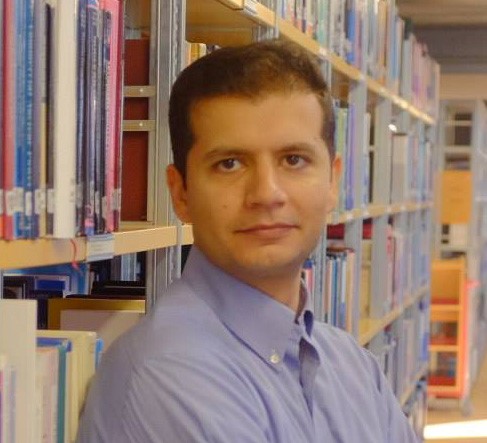InterPore Academy Recorded Short Course
Lecturer: Hadi Hajibeygi
Title: Multiscale Modeling and Simulation: Scalable Simulation of Nonlinear Processes in Heterogeneous Fractured Porous Media
To access the Short Course, please register here.
Course registration for recorded short course:
Interpore members 150€ students, 200€ academic, 300€ industry
Interpore non-members 200€ students, 250€ academic, 350€ industry

Hadi Hajibeygi, TU Delft, The Netherlands
Hadi is an associate professor at TU Delft, where he teaches and leads research on modeling, simulation and sensitivity analysis of subsurface processes for large-scale renewable energy storage, geo-energy exploitation, and greenhouse gas storage. He co-leads Delft Advanced Reservoir Simulation (DARSim) and Leads TU Delft Subsurface Storage Theme. He has been co-chair of the Interpore scientific program committee for 3 years, and is in the committee of ECMOR & MIT Energy Symposium. He was the most Innovative Teaching Talent of TU Delft in 2018, and holds PhD (with medal) from ETH Zurich, and has experience with Chevron Energy Technology Company in California. He did his post-doctoral research at Stanford University, until 2013 when he joined TU Delft. He is a Dutch National Science ViDi Laurette of 2019.
Course Abstract:
The increasing demand for accurate and efficient simulation of flow and mechanics in subsurface formations motivates development of advanced computational methods. The non-linear, heterogeneous, uncertain, dynamic and coupled nature of the mathematical formulations–describing flow, transport, and reaction–make such developments quite challenging, yet possible if a multiscale methodology is followed. Such a multiscale methodology should allow for a physics-algebraic-based dynamic multilevel description of the highly-resolved heterogeneous discrete equations in space and time. At the same time, it allows for crossing up and down between any resolutions, and systematic error reduction to any desired level. This short course is offered to enable the attendees to get an in-depth knowledge and hands-on implementation skills for the so-called “basis-function-based multiscale methods”, and their extensions to complex systems with fractures. At the end of this course, all participants will develop their own multiscale simulator in Matlab/Python from scratch.
Learning objectives:
Short course includes 20 hours of lectures in four days. Lecture materials will be distributed ahead of the class.
Lecture 1 (5 hrs)
1. Formulate fully-coupled and sequentially-coupled multiphase simulation
a. Governing equations describing multiphase flow in porous media
i. Upscaling Pore-scale (mm) to Darcy’s scale (cm)
ii. Multiscale Darcy’s scale (cm) to Field scale (km)
b. Selection of the main unknowns & the coupling scheme
2. Formulate the multiscale procedure for pressure
a. The concept of discretization at different resolution
b. Multiscale basis functions
c. Coarse-scale system & approximate fine-scale solution (continuum vs algebraic formulation)
3. Develop your own 1D multiscale simulation of flow in heterogeneous porous media
a. Revisit the logic of programming
b. Fine-scale pressure solver
c. Multiscale pressure solver
4. Analyze the results, discuss the pros and cons.
Lecture 2 (5 hrs)
5. Algebraic formulation of the multiscale methods
a. Construct the multiscale operator, based on the fine-scale system
b. Analyze the pros and cons of algebraic formulation vs continuum formulation
c. Discuss algebraic implementation of upscaling methods
6. Develop 2D multiscale simulator for flow
a. Implement 2D pressure simulation with multiscale solver
b. Compare the multiscale & upscaling results
7. Compare flow-based upscaling & basis-function multiscale methods
8. Iterative multiscale methods
a. Construct an iterative strategy to control the multiscale errors
b. Run & discuss the simulations for complex systems
Lecture 3 (5 hrs)
9. Flow in fractured media using Embedded Discrete Model (EDFM and pEDFM)
a. Review the state-of-the-art discrete fracture modeling approaches
b. Embedded discrete fracture model: concept and formulation
c. Projection-based embedded discrete fracture model: concept & formulation
10. Practice EDFM and pEDFM simulation
a. Run simulations with discrete fractures using EDFM
b. Discuss the sensitivities and results
Lecture 4 (5 hrs)
11. Multiscale fully-implicit simulations for complex geo-systems (ADM & CPR-MS)
a. Revisit the CPR: concepts and methods
b. Revisit adaptive mesh refinement: concepts and methods
c. Formulate a multiscale strategy for fully-implicit simulations using:
i. CPR-Multiscale approach
ii. Algebraic Dynamic Multilevel (ADM)
12. Practice multiscale fully-implicit simulation
a. Run simulations with DARSim multiscale simulator and investigate dynamic multiscale performance.
Course registration fee for recorded viewing:
Interpore members 150€ students, 200€ academic, 300€ industry
Interpore non-members 200€ students, 250€ academic, 350€ industry
